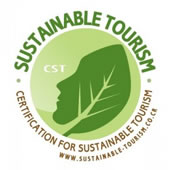ARENAL MANOA SUSTAINABILITY EFFORTS
Arenal Manoa Resort Hotel & Hot Springs is committed to mitigating the impact of our operations in the natural environment that surrounds us and which our guests come to relax and play in. We are part of the Sustainable Tourism Program, developed by the Costa Rican Tourism Board.
This rigorous set of standards which we are evaluated on yearly, include the reduction in consumption and waste of materials, water and energy, as well as proper disposal of materials, including recycling. We not only continuously train our staff, but we involve our local community in areas of education and environmental awareness. We are proud to provide jobs for the community, and not only employ locals, but also use regional providers whenever possible.

Conserving water
Reusing towels
Depositing waste in corresponding bins
SUSTAINABILITY POLICIES
Arenal Manoa Hotel is a sustainable business in the hotel and services industry. The business located in San Carlos, Alajuela, aims at reaching productive management within sustainable, sociocultural, and economic guidelines. We know that by protecting the environment, as well as by providing customer satisfaction, we not only contribute to sustainable development but can also reach CST (Certification for Sustainable Tourism) standards to establish sustainability guidelines. In this way, we can define policies to help the company work in accordance with environmental, sociocultural, and quality principles.
- Know and meet the needs and requirements of our customers by paying attention to detail, committing to excellence, and offering a warmth stay.
- Understand that the main objective of our policy is to reduce the impact created from the use of materials, water and energy and the production of waste.
- Involve the community in the hotel’s environmental mitigation and awareness projects, and support other groups to promote cultural enhancements in the area.
ARENAL MANOA HOTEL SUSTAINABILITY POLICIES
As part of our commitment to environmental policy, we aim at achieving the following objectives:
- Identify, modify, and control activities in the hotel that can have a negative impact in the environment.
- Think of environmental protection as one of the main factors to take into consideration when implementing a new activity or service in the hotel.
- Involve the staff in environmentally friendly practices to create awareness and promote operations that protect the hotel’s natural, sociocultural, and economic environment.
Environmental
- Thoughtfully use natural resources, water, soil, and energy by constantly monitoring usage and impact.
- Contribute to the preservation of flora and fauna, and Costa Rican ecosystems and landscapes.
- Correctly dispose of waste generated by the hotel.
- Help prevent the extraction and commercialization of wild products and species as well as objects of archeological heritage.
- Do not feed wild animals artificially.
- Provide preventive maintenance to the company’s equipment and facilities.
- Use natural light as much as possible.
- Unplug electric equipment and electronics that are not being used.
- Set air conditioners in offices at 24º- 25ºC and turn them off when leaving the room.
- The hotel vehicles used in daily operations must comply with RTV (technical vehicle review mandatory in Costa Rica) and have the registration certificate up to date.
- Have smoke free spaces.
Social and cultural
- Collaborate with the local community to improve life quality and benefit tourism.
- Respect native cultures and encourage guests to learn more about them and protect them.
- Prioritize selecting and hiring people from the local community while complying with the current labor law.
- Buy products from local and national producers.
- Support cultural, sport and environmental activities organized by the local community.
- Create offers and packages aimed directly at national tourism.
- Act against the commercial sexual exploitation of children and teenagers.
- Involve the local community in environmental mitigation and awareness projects of the hotel.
- Improve accessibility in the facilities to ensure people with disabilities enjoy the stay in the hotel.
Economic
- Follow local, national, and international legislation and regulations on tourism.
- Commit to the constant improvement of the hotel’s operations and functions.
- Make responsible use of products and services used in day-to-day activities.
- Know and satisfy the needs and implicit and explicit requirements of our clients by paying attention to detail and striving for excellence.
CONSERVATION AREAS AND CULTURAL HERITAGE
CONSERVATION AREAS
Costa Rica has the privilege of preserving national parks and reserves that make up for an important part of its territory (13,000 square kilometers), and that protect our most valuable natural and historic heritage.
The country’s conservation areas encompass national parks or terrestrial and marine biological reserves that are comprehensively managed and that greatly benefit nearby communities.
Protected natural spaces are important to guard and protect natural diversity, avoid the excessive exploitation of natural resources, and capture 15% of the planet’s carbon dioxide emissions.
Protected areas have the following functions:
- Protect biodiversity.
- Regulate human activities and impact in natural spaces to preserve and restore them.
- Capture the excess of atmospheric CO2.
- Regulate the climate.
- Preserve water reserves.
- Maintain soil fertility.
- Provide food and raw material resources.
Arenal Huetar Norte Conservation Area
- Arenal Volcano National Park
- Caño Negro National Wildlife Refuge
Arenal Tempisque Conservation Area
- Tenorio Volcano National Park
Central Conservation Area
- Guayabo National Monument
- Braulio Carrillo National Park
- La Cangreja National Park
- Los Quetzales National Park
- Tapantí Macizo de la Muerte National Park
- Irazú Volcano National Park
- Poas Volcano National Park
- Turrialba Volcano National Park
- Alberto Manuel Brenes Biological Reserve
Guanacaste Conservation Area
- Rincón de la Vieja National Park
- Santa Rosa National Park
La Amistad Caribe Conservation Areas
- Cahuita National Park
La Amistad Pacífico Conservation Area
- La Amistad International Park
- Chirripó National Park
Cocos Marine Conservation Area
It is located in the Pacific Ocean, 535 km away from Cabo Blanco, south of the Nicoya Peninsula, in the southwest direction between latitudes 5”30’ and 5” 34’ and the meridians 87” 1’ and 87” 6’.
In December 1997, it was declared as Natural World Heritage by UNESCO; in May 1998, Wetland of International Importance (Ramsar Site); and in December 2022, Cultural Historic Site by the Costa Rican Ministry of Culture and Youth (MCJD by its acronym in Spanish).
Osa Conservation Area
- Corcovado National Park
- Marino Ballena National Park
- Piedras Blancas National Park
- Isla del Caño Biological Reserve
Central Pacific Conservation Area
- Carara National Park
- Manuel Antonio National Park
- San Lucas Island National Park
- Tempisque Conservation Area
- Barra Honda National Park
- Las Baulas Marine National Park
- Diriá National Park
Tortuguero Conservation Area
- Tortuguero National Park
- Barra del Colorado Wildlife Refuge
Source: SINAC

